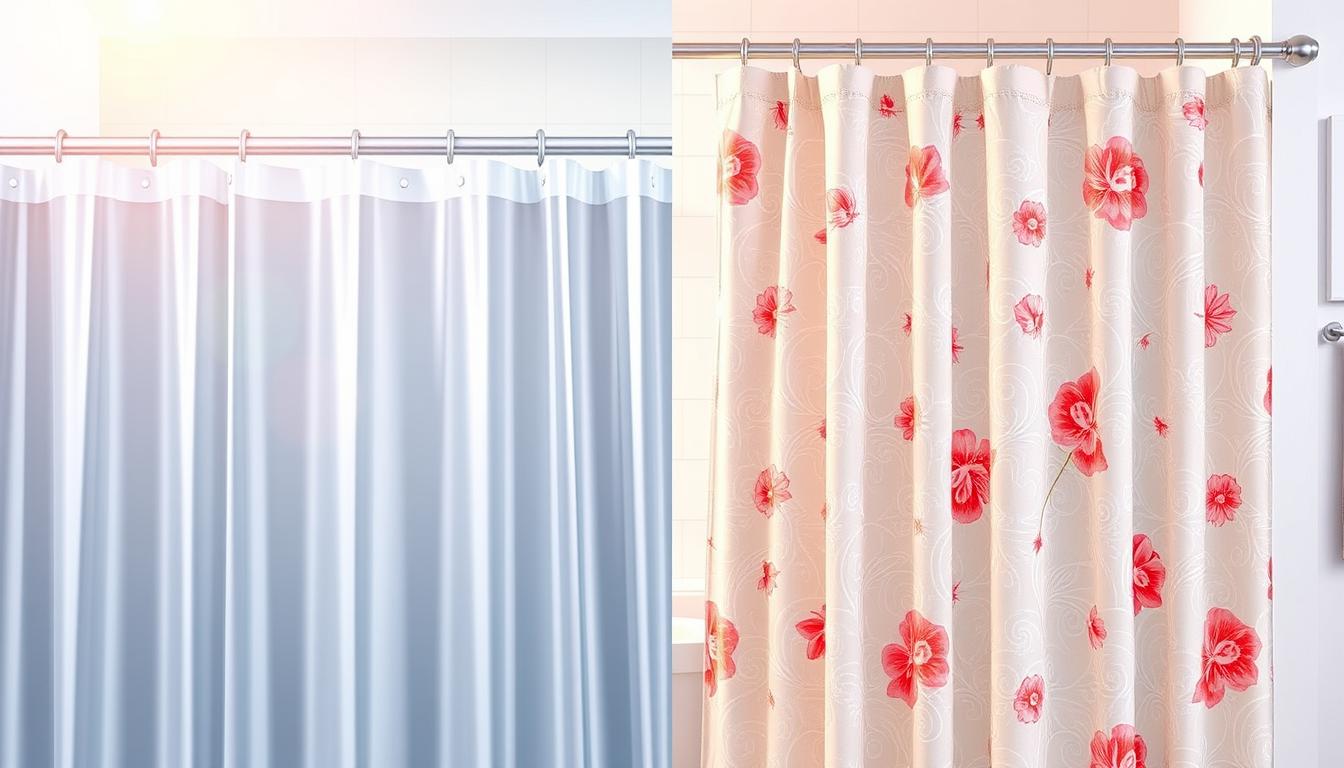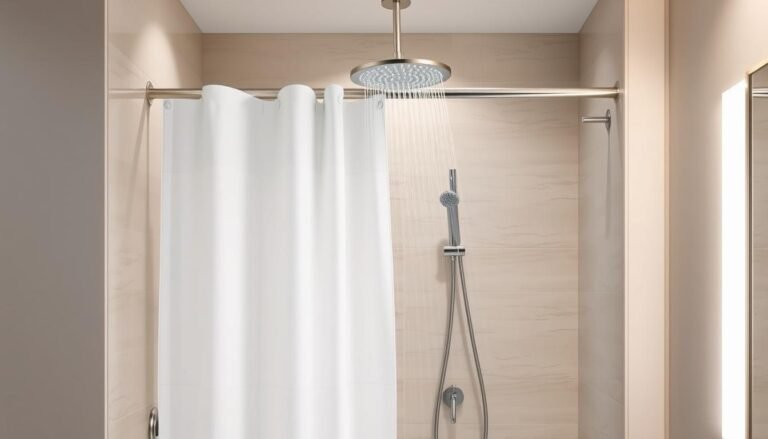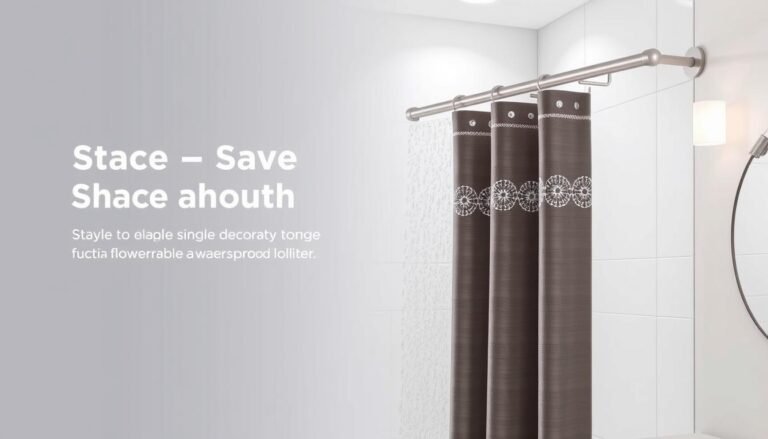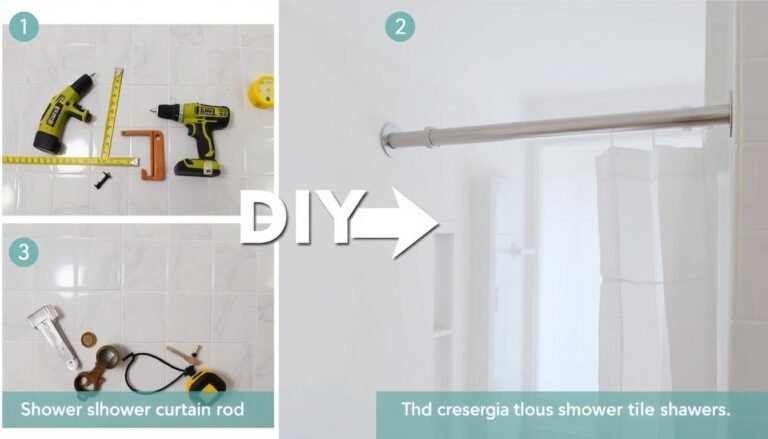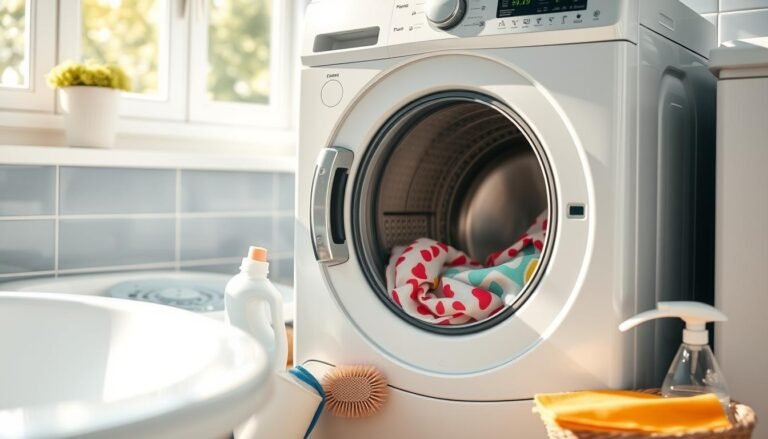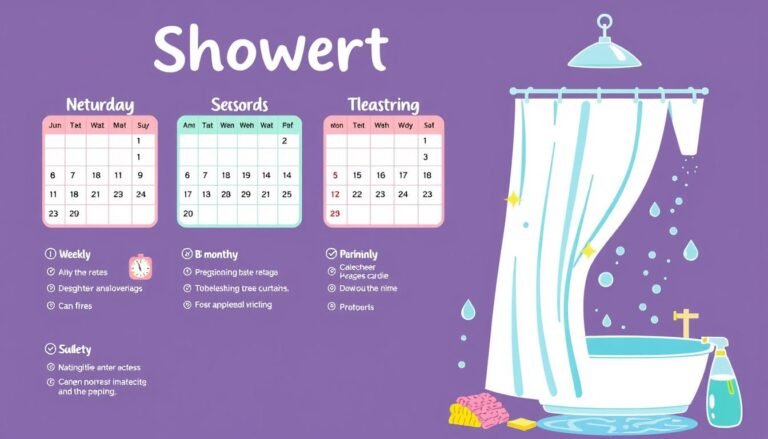Plastic vs. Fabric Shower Curtain: Which Wins?
The debate over shower curtains goes beyond looks. It’s about our planet, health, and how easy they are to clean. A 2008 CHEJ study showed PVC liners can release harmful smells. These smells can cause headaches and nausea. So, people are looking at fabric options more. These can be washed and are better for the Earth.
When we compare plastic and fabric shower curtains, each has good and bad points. PEVA and EVA liners, like the Quiet Town Sun Shower Curtain Liner, are safer for the Earth. Meanwhile, fabric ones from The Company Store feel nicer and make less noise.
Choosing between plastic and fabric involves looking at endurance, cost, and style. The Gorilla Grip liner is affordable, under $10. But, the Brooklinen linen set has a fancy design and feels luxurious.
The material you choose affects more than how your bathroom looks. It’s also about your wellness and how you impact the environment. Whether you want something cheap and tough or quiet and soft, understanding each material helps. This knowledge helps you pick what’s best for your bathroom.
Introduction to Plastic and Fabric Shower Curtains
Shower curtains are vital for both function and design in bathrooms. Choosing between plastic and fabric types means knowing their traits. Plastic curtains, made from PVC or PEVA, are budget-friendly and resist water well. Fabric options, like polyester or cotton, blend style with easy care.
When picking the best material for a shower curtain, think about moisture resistance. Fabric curtains from polyester or microfiber suit daily use well. They resist mold and are easy to clean, making them eco-friendly since you can use them again.
Plastic shower curtains are cheaper. PEVA options are totally waterproof, great for busy bathrooms. But, PVC curtains might release harmful chemicals and have phthalates. Fabric curtains, particularly organic ones, are a safer bet.
Fabric curtains also keep your bathroom warmer and come in many styles. They make your space quiet and comfy. Unlike noisy plastic curtains, they add a touch of peace.
To choose well, know the pros and cons of each material. Your final pick between plastic or fabric for your shower curtain depends on what you value most. Consider cost, style, durability, and health when deciding.
| Aspect | Plastic Shower Curtain | Fabric Shower Curtain |
|---|---|---|
| Water Resistance | Excellent (PVC, PEVA) | Very Good (Polyester, Nylon) |
| Cost | Lower | Higher |
| Health Impact | Releases VOCs, may contain phthalates | Healthier, especially organic materials |
| Mildew Resistance | Moderate | High (Polyester, Nylon) |
| Machine Washable | No | Yes |
| Eco-Friendly | Disposable | Reusable |
| Insulation | Poor | Better |
| Noise Level | Loud | Quiet |
Is a Plastic or Fabric Shower Curtain Better?
It’s tough to choose between plastic and fabric shower curtains. They both have benefits and downsides. Your choice depends on what’s more important to you: maintenance, comfort, or the environment.
Plastic shower curtains are great at keeping water away and avoiding mold. They’re water-resistant, so they don’t need cleaning often. But, they might let out harmful fumes and aren’t great for the planet. They’re made with bad chemicals like PVC. Although cheaper, think about their effect on health and nature.
Fabric shower curtains can make your bathroom look nicer. They come in materials like cotton and polyester. You can throw them in the washer. Yet, they need cleaning more often to stop mold. Some are eco-friendly, which is better for the earth than plastic ones.
- 36 answers total guided the discussion on shower curtain liner orientation, with varied perspectives on looks and water performance.
- Research narrowed down 48 options to 18 based on characteristics like water resistance and durability.
- The Brooklinen Shower Curtain showed minimal shrinkage (3 inches in width, 1¾ inches in length) post laundry, whereas other models, such as the Threshold Waffle Weave, displayed higher rates.
Explore moreabout the long-term considerations when choosing between plastic and fabric shower curtains.
| Feature | Plastic Shower Curtain | Fabric Shower Curtain |
|---|---|---|
| Water Resistance | High | Moderate |
| Maintenance | Low to Moderate | Moderate to High |
| Environmental Impact | PVC, Harmful | Eco-friendly Options Available |
| Cost | Low | Varies |
| Style Options | Limited | Abundant |
Advantages of Plastic Shower Curtains
Plastic shower curtains are a top choice in many homes. They stand out for their durability, affordability, and ability to resist water. These benefits make them a preferred option.
Durability and Maintenance
Plastic curtains are known for lasting longer than fabric curtains. They handle moisture well because they don’t soak up water. This resistance to water means less chance of mold and mildew.
Cleaning them is easy with everyday cleaners like baking soda. Sometimes they need a bit of scrubbing. But, this effort keeps them looking good and mold-free for a long time.
Cost-Effectiveness
Plastic curtains are also wallet-friendly. They cost less than fabric curtains. This makes them a smart pick for saving cash without sacrificing quality or performance. They give great value by being durable and water-resistant.
Water Resistance
Keeping water inside the shower is what plastic curtains do best. This does a lot to keep bathroom floors dry and safe. It’s especially helpful in bathrooms used by kids. PEVA, a kind of plastic, is great at this and also doesn’t have harmful chemicals like VOCs.
Here’s a table showing differences between PEVA, PVC, and fabric shower curtains:
| Material | Durability | Water Resistance | Environmental Impact | Cost-Effectiveness |
|---|---|---|---|---|
| PEVA | High | Excellent | Low | High |
| PVC | Moderate | Good | High | Moderate |
| Fabric | Varies | Poor to Moderate | Varies | Low |
Benefits of Fabric Shower Curtains
Fabric shower curtains add a lot to your bathroom. They make it look stylish, are eco-friendly, and easy to take care of. Knowing which material to choose can make your bathroom look and work better.
Style and Aesthetics
Fabric shower curtains are all about style. They fall more smoothly than plastic, giving a rich, soft look. Fabrics like linen, cotton canvas, and hemp are not just nice to look at. They also feel good to touch.
Finding the right material means your shower curtain will fit perfectly. It will look tidy, without too much extra fabric hanging down.
Environmental Impact
Fabric curtains are better for the planet. They don’t have the harmful chemicals that plastic ones do. And, they don’t add to the trash problem.
Hemp curtains, for example, are 100% eco-friendly. They resist mold and help cut down on pollution. Since they can break down naturally, they’re much kinder to the earth.
Ease of Cleaning
It’s easy to keep fabric curtains clean. Many can just be thrown in the washing machine. Polyester and nylon ones dry fast and don’t get moldy as plastic does.
You can even use simple cleaners like baking soda and vinegar on tough spots. This makes fabric curtains not just stylish but also very practical.
Durability Comparison: Plastic vs Fabric Shower Curtains
When looking at plastic vs fabric shower curtains, it’s crucial to know which lasts longer. Plastic curtains, such as those made from vinyl or EVA, are very durable. They are easy to clean and stay water-resistant. For example, the Gorilla Grip liner, which comes in sizes like 72 x 72 inches, shows how long-lasting plastic can be.
Fabric curtains are also durable, especially ones made from polyester or with antimicrobial treatments. The Brooklinen Shower Curtain dries quickly to avoid mold, making it last longer. The Hookless Escape curtain combines durability with style, featuring sheer upper panels and ribbon details.
In the debate on which is more durable, plastic or, both have their advantages. Vinyl and EVA curtains, such as the Quiet Town Sun Shower Liner, have features like weighted edges that make them very durable. Fabric curtains offer a stylish look and can last long if taken care of properly. For guidance on choosing the right shower curtain, check out this helpful link.
Choosing Between Plastic and Fabric Shower Curtains for Bathroom Design
When it comes to bathroom design, choosing between plastic and fabric shower curtains is key. Plastic curtains are great for keeping water in the shower because of their water resistance. But, a fabric curtain, made from materials like polyester, can protect against water too. They also look nicer.
If you love a bit of luxury, fabric curtains are the way to go. They might cost more at first, but they last long, are easy to wash, and add value over time. Plus, an option like a cotton curtain with a PEVA liner is both practical and good for the planet. This choice helps cut down waste and avoid harmful chemicals.
Can’t decide? A mix of a stylish fabric curtain and a plastic liner could be perfect. It’s smart to weigh the pros and cons of each material. Plastic curtains are more affordable but fabric types are better for health. For tips on finding the ideal shower curtain, check here.

Hey there, I’m Alex Hanson and I’m passionate about all things covers! Whether you’re looking for a car seat cover to protect your vehicle or an oven cover to keep your kitchen clean, I’m here to help. With years of experience in the industry, I have plenty of knowledge and insights to share with my readers. So, if you care about protecting your belongings and making them look their best, you’re encouraged to read my blog as I explore the perfect cover for every need.

